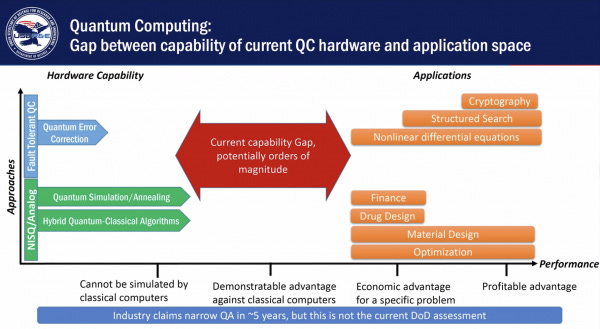The Week in Quantum Computing - December 25th - fun fun fun.
Issue #166
The Week in Quantum Computing. Brought to you by Sergio Gago (@piratecto).
Quick Recap
After the last few weeks with big announcement drops, we did not expect much for the holiday season. But lo and behold, Santa has dropped some nice presents under the tree. Starting a plethora of great articles worth read during the holidays. A glimpse at Eduardo Miranda’s amazing work on Quantum Music, the last from Bob Coecke on how Quantum in Pictures taught quantum to school children and a great paper on the ethical lines required for Quantum adoption. Also a couple of pieces on whether there is hype or not in Quantum, including the DoD on reframing timelines. The year in Physics and in Computer Science videos are out, And the new guide on migration to PQC by NIST.
But that is not all. Nokia and HellasQCI, a consortium of 14 Greek public and private entities, have successfully demonstrated Quantum-Safe Networks (QSN) across Greece. Kipu Quantum, a German quantum software company, has secured 10.5 million EUR in seed funding for the expansion of their team and to keep developing compressed quantum algorithms. Alice & Bob, a hardware developer, has taped out a new chip, Helium 1, a 16-qubit quantum processing unit (QPU), expected to improve error rates with every added qubit. They are the third company joining the “logical qubit” race, together with Quantinuum and MIT+QuEra (and also IBM+Q-Ctrl).
QCentroid and Tecnalia put together a partnership to bring quantum to the enterprise.
Zapata AI has published research on quantum-enhanced Generative AI in Nature Communications, “demonstrating” how quantum circuits can extend and complement classical generative AI capabilities. Well… not quite. They have found that QML circuits without barren plateaus are classically simulable. They have not found any real intersection between Generative AI and Quantum. (But hopefully they may in the future!). And lastly no end of year without our factoring prime numbers paper (Remember last year with Schnorr’s technique?). This time with a Grover-like algorithm. The published paper (link below) tries to find a different way (not through Shor) to break RSA. But don’t start turning tables yet. From the paper:
"[in terms of speed], the presented algorithm is likely not competitive against Shor’s algorithm or the best classical factoring algorithms for large problem sizes, which highlights the need to exploit structure in the problem for achieving a practical quantum advantage over classical computers. On the other hand we anticipate practical applications for benchmarking quantum computers on verifiable problems involving variable numbers of qubits."
Hey, before you go ahead and dive into the articles. A Christmas request if you may. You may have seen all the developments in the last months and how roadmaps are advancing. Seeing the new logical qubits, hardware, funding, new startups, etc. So, based on that and your informed opinion: Do you think we will have an RSA-2048 capable quantum computer by 2030? (This is no joke, I have a bet on this! :P )
Happy Holidays everyone!
The Week in Quantum Computing
Physicist Bob Coecke: ‘It’s easier to convince kids than adults about quantum mechanics’
Belgian physicist and musician Prof Bob Coecke, 55, wants to teach quantum physics to a mass audience. The paradox-filled theory that describes the microscopic realm has become a staple of science fiction, from Marvel’s Ant-Man to the multiple Oscar-winning Everything Everywhere All at Once.
https://ift.tt/Xgn8v0K
Quantum Leap: Is Quantum Machines’ OPX1000 Ushering in a New Era for Computing?
As we stand on the precipice of a computational revolution, whispers of a machine that could outpace our wildest dreams swirl through the air.
https://ift.tt/8ZAfgIF
HellasQCI and Nokia lead way to the future of Quantum-Safe Networks
Nokia and HellasQCI, the Greek National Quantum Communication Infrastructure Consortium, have successfully completed a proof of concept (PoC) of Quantum-Safe Networks (QSN) across three locations in Greece. The PoC demonstrated hybrid key generation using both classic and quantum physics to generate Quantum-Safe keys for encrypted optical services. The HellasQCI consortium, led by GRNET, comprises 14 public organizations and private corporations. Nokia's Quantum-Safe Key orchestrator was instrumental in managing key requests and assuring Quantum-Safe services. Dr. Ognjen Prnjat of GRNET and James Watt of Nokia emphasized the importance of this milestone for the future of secure communications. The findings underscore the critical role of Quantum-Safe Networks in safeguarding critical infrastructure against quantum attacks.
10.5 Million EUR for German Quantum Software Company Kipu Quantum
Kipu Quantum, a German quantum software company, has secured 10.5 million EUR in seed funding led by HV Capital and DeepTech & Climate Fonds. The firm, founded by Enrique Solano, Tobias Grab, and Daniel Volz, develops compressed algorithms for high-performing quantum computers, serving industries such as pharmaceutical, chemical, logistics, and finance. The funds will be used to expand their team of quantum scientists, researchers, and engineers. Kipu Quantum's software is already in use at major industrial customers including BASF. Solano highlighted that their compressed algorithms allow the use of today's quantum processors across multiple industries. The company recently set a new performance world record for protein folding.
https://kipu-quantum.com/10-5-million-eur-for-german-quantum-software-company-kipu-quantum/
COO of Quantum Computing Inc., Bill McGann, Presents a New Quantum Intelligence Platform Leveraging Reservoir Computers
Quantum Computing Inc.'s (QCi) COO, Bill McGann, has introduced a unique quantum intelligence platform using reservoir computers. The Virginia-based company aims to enhance, not replace, existing artificial intelligence (AI) systems, with a focus on hardware-centric strategies for edge deployment. The long-term goal is to develop a reservoir quantum computer, marking the next generation of their technology. Unlike other firms that rely on software, QCi's approach is primarily hardware-based. McGann emphasized the uniqueness of their quantum intelligence, machine learning, and AI approach, and their commitment to hardware-based solutions. The strategy could set QCi apart in a future where AI and machine learning are increasingly crucial.
Scaling Up a Trapped-Ion Quantum Computer
Steven Moses and his team at Quantinuum have made significant advancements in trapped-ion quantum computing, with their Quantinuum System Model H2. They have managed to increase the number of qubits from 20 to 32 without raising the error rate. The system, which uses a racetrack-like structure for ion movement, combines three key features for improved functionality and scalability. The team conducted thorough component-level testing, system-level benchmark tests, and implemented a set of algorithms, achieving a record quantum volume of 216. However, the team acknowledges challenges ahead, including the need for a truly two-dimensional architecture and improving computation time. The research sets a strong precedent for future quantum computing efforts.
https://physics.aps.org/articles/v16/209
Alice & Bob tapes out quantum chip to perform error correction and to demonstrate a logical qubit prototype
Alice & Bob, a hardware developer focused on fault-tolerant quantum computers, has taped out a new chip, Helium 1, a 16-qubit quantum processing unit (QPU), expected to improve error rates with every added qubit. This milestone aligns with the company's roadmap to create its first error-corrected logical qubit with lower error rates than any existing single physical qubit. The company's CEO, Théau Peronnin, highlighted the chip's capacity to suppress errors, stating, "Helium 1 is our new platform to exponentially suppress the remaining errors as we add more depth." The Paris and Boston-based startup, founded in 2020, has already raised €30M in funding and boasts over 80 employees.
UK's Quantum Computing Sector Set for Major Leap in 2024: Riverlane, Quantinuum, and NQCC Lead the Charge
The UK's quantum computing sector is poised for significant growth and development in 2024, with a shift in focus from computing capacity to quality, particularly through quantum error correction, according to Maria Maragkou, VP of product at Riverlane. The year will also see increased adoption and standardisation of quantum technologies, as per Ilyas Khan, founder and CPO at Quantinuum. Dr Simon Plant, deputy director for innovation at the National Quantum Computing Centre (NQCC), anticipates the completion of the NQCC's flagship facility and £30m investment in quantum computing testbeds by 2025. The year could also mark the first demonstration of quantum advantage, a milestone for the industry, notes Neil Cameron, investment director at Parkwalk Advisers.
https://www.uktech.news/deep-tech/uk-quantum-computing-predictions-2024-20231219
How to get a job in quantum computing
Quantum computing, leveraging quantum mechanics, provides a faster solution to complex problems beyond the reach of classical computers. This rapidly evolving field offers exciting career opportunities with lucrative annual salaries. The article provides useful guidance for individuals aiming to secure their first job in quantum computing. The focus is on understanding the unique problem-solving capabilities of quantum computers and the high-value career prospects in this cutting-edge technology sector.
https://www.fastcompany.com/90999848/quantum-computing-careers-explained
Quantum Generative AI Research in Nature Communications
Zapata AI, an industrial generative AI company, has published its research on quantum-enhanced Generative AI in the prestigious Nature Communications journal. The study, titled "Synergistic pretraining of parametrized quantum circuits via tensor networks," demonstrates how quantum circuits can extend and complement classical generative AI capabilities. The research builds on Zapata AI's portfolio of quantum techniques for generative AI, offering benefits such as compressing large models and speeding up costly calculations. CEO Christopher Savoie emphasized the synergistic use of quantum and classical techniques for better results. The research, led by Senior Quantum Scientist Jing Chen, provides a unique synergy between tensor networks and quantum algorithms, addressing complex problems more effectively.
https://zapata.ai/news/quantum-generative-ai-research-in-nature-communications/
Paper: Early Fault-Tolerant Quantum Computing
A research team comprising Amara Katabarwa, Katerina Gratsea, Athena Caesura, and Peter D. Johnson has developed a model for early fault-tolerant quantum computing (EFTQC) architectures. Their work explores the transition between near-term intermediate scale quantum (NISQ) and fault-tolerant quantum computing (FTQC), envisioning operation with tens of thousands to millions of physical qubits. The team demonstrated that with just over one million physical qubits, the "reach" of a quantum computer can be extended from 90-qubit instances to over 130-qubit instances using an early fault-tolerant quantum algorithm. This development underscores the potential of EFTQC in the era of limited-scalability quantum computing.
https://arxiv.org/abs/2311.14814v1
GQI’s Take on Harvard’s Logical Qubits Demonstration - Executive Summary
Harvard researchers, in collaboration with MIT, QuICS, and QuEra, have demonstrated quantum error correction codes using up to 48 logical qubits, leveraging a technique of flexible qubit shuttling. The experiment, which builds on research starting in 2017, utilized up to 280 physical qubits to create logical qubits and up to 200 2Q logical gates. Despite the progress, Global Quantum Information (GQI) does not consider this a 'Sputnik moment' for fault-tolerant quantum computing. Challenges such as code scaling to suppress logical errors, creating universal fault-tolerant circuits with realistic clock times, and scaling the platform to a commercially relevant size still need to be addressed. The findings demonstrate a significant step forward, yet underline the complexity of achieving practical fault-tolerant quantum computing.
How HPC Centers Can Start the Move to Quantum Now
High-Performance Computing (HPC) and supercomputing centers need to start preparing for the quantum era, according to Mark Mattingley-Scott, Chief Revenue Officer for Quantum Brilliance. He suggests a small and incremental quantum strategy for clients looking to gain an edge over competitors. Traditional quantum systems are expensive due to the cooling requirements, but rack-mountable quantum systems that operate at room temperature and use synthetic diamonds for qubit creation offer a viable alternative. These diamond quantum systems provide the longest coherence time of any room-temp quantum state and can operate anywhere a classical computer can, enabling immediate-proximity, hybridized quantum-classical supercomputing centers. Mattingley-Scott emphasizes the need for HPC centers to understand the best way forward to meet customer needs.
https://insidehpc.com/2023/12/how-hpc-centers-can-start-the-move-to-quantum-now/
Migration to Post-Quantum Cryptography
The advent of quantum computing technology threatens to compromise many existing cryptographic algorithms, particularly public-key cryptography, warns the National Institute of Standards and Technology (NIST). Practical quantum computers could make all public-key algorithms and associated protocols vulnerable to criminals and competitors. To mitigate this, NIST is developing practices for migrating from current public-key cryptographic algorithms to quantum-resistant ones. The organization is also soliciting public comments on its preliminary drafts. The guidance is intended for organizations that provide cryptographic standards and protocols, and those that develop and service cryptographic products. The urgency to plan for the replacement of hardware, software, and services using public-key algorithms is underscored, to protect information from future quantum attacks.
Quantum Strategy for Business - Qureca
Qureca has created a course designed to cultivate quantum leaders for business. By equipping participants with knowledge of quantum technologies, the course aims to enable them to guide organizations towards successful preparation for the adoption of these technologies. The ultimate goal is to drive innovation and build a competitive edge for businesses through quantum technologies. The course is led by Brian Lenahan, author of Quantum Boost and founder of the Quantum Strategy Institute.
https://qureca.com/quantum-strategy-for-business/
US DoD's John Burke Urges Cost-Effective Quantum Tech Development at Consortium Meeting, Highlights Potential of Quantum Information Sciences
John Burke, the principal director of quantum science for the U.S. Department of Defense (DoD), highlighted the need for cost-effective quantum technology at the Quantum Economic Development Consortium's annual meeting. Burke noted that while the DoD sees potential in quantum information sciences - including quantum computing, cryptography, and sensors - cost and technology readiness are current barriers. The DoD is adopting a "wait and see" approach, encouraging industry members to continue developments and take advantage of DoD outreach efforts. Burke also mentioned ongoing programs such as DARPAONISQ, DARPAUS2QC, and Quantum Benchmarking, aimed at delivering analysis for better future assessments of quantum computing.
https://www.hpcwire.com/2023/12/19/dod-takes-a-long-view-of-quantum-computing/
Quantum Computing in the Enterprise: QCENTROID and TECNALIA
QCENTROID, the first Operations Platform for quantum computing, has signed a collaboration agreement with TECNALIA to facilitate the distribution and incorporation of real quantum computing solutions into organizations. According to Esther Villar, head of quantum technologies at TECNALIA, we are entering the phase of utility in quantum technology. QCENTROID CEO, Carlos Kuchkovsky, emphasizes their portfolio minimizes risk and ensures a sensible, frictionless integration of these technologies into current processes. The agreement combines TECNALIA's expertise with QCENTROID's development assets to make quantum computing solutions completely reliable.
https://www.tecnalia.com/sala-de-prensa/qcentroid-tecnalia-computacion-cuantica
The Devil in the Details: A Survey of Current Approaches to Building a Quantum Computer
Quantum computing, with its potential to revolutionize various sectors, is currently being explored by researchers and companies worldwide. Despite the theoretical and engineering challenges, advancements are being made in building and scaling quantum machines. Quantum technologies such as quantum sensing and communication have already shown promising results in defense, medicine, and secure communications. The focus is now on constructing qubits, or quantum bits, which can represent multiple states simultaneously, thus enabling quantum computers to handle exponentially more complexity than conventional computers. While experts estimate that a general-purpose quantum computer might require one million qubits, current leading quantum processors have demonstrated around one thousand. There is ongoing debate about the best approach to qubit construction, with no clear superior method yet identified. The journey towards realizing the full potential of quantum computing is a complex one, with every step bringing us closer to unprecedented computational power.
Researchers Develop Cameras to Visualise Quantum States
Researchers have developed innovative cameras capable of visualizing quantum states, a significant leap in quantum computing. This development was accomplished by a team registered under Informa UK Limited, a company based in London, England. The company, with registration number 1072954, has its office in 5 Howick Place. This advancement in quantum technology signifies a crucial step towards understanding and harnessing the power of quantum mechanics.
https://www.iotworldtoday.com/quantum/researchers-develop-cameras-to-visualise-quantum-states
Paper: Quantum Factoring Algorithm using Grover Search
S. Whitlock and T. D. Kieu have developed a quantum factoring algorithm that uses Grover search to factorize any n-bit biprime using 2n-5 qubits or less. The algorithm, which doesn't rely on any properties of the number to be factored, guarantees convergence and doesn't necessitate complex classical pre or post-processing. Simulations have confirmed an asymptotic success rate of 100% for more than 800 random biprimes with 5 ≤ n ≤ 35, corresponding to 5 - 65 qubits. The largest factored number was 30398263859. Furthermore, a variant of the algorithm based on digital adiabatic quantum computing showed that Grover-based factorization requires quadratically fewer iteration steps in most cases.
https://arxiv.org/abs/2312.10054v1
Joining forces in the quantum age: the role of NATO
Elena Yndurain, a specialist in emerging technologies, recently participated in the NATO conference "Copenhagen Quantum 2023: Towards a Transatlantic Community". The conference highlighted the transformative potential of quantum technologies, and the need for democratic nations to collaborate on their ethical and secure use. Quantum technologies, which encompass sensing, encryption, and computing, have the potential to revolutionize society and create a stronger world. However, misuse of these technologies could lead to systemic risks, including threats to global security. According to a McKinsey & Company study, quantum technology could generate a $106 trillion market by 2040. To ensure responsible use, cross-country collaborations and partnerships between governments, universities, and industry are crucial. The power imbalance in quantum technology investment, with China investing $15.3 billion compared to the US's $3.7 billion, underscores the need for such cooperation.
https://www.linkedin.com/pulse/joining-forces-quantum-age-role-nato-elena-yndurain-ivd2f
MareNostrum5: Another milestone in the EU’s supercomputing ecosystem
The Barcelona Supercomputing Centre (BSC) in Spain has unveiled the MareNostrum5 supercomputer, a significant addition to the European High Performance Computing Joint Undertaking (EuroHPC JU). The system, which cost over €151 million, is designed to boost medical research, including drug and vaccine development, virus spread simulations, artificial intelligence, and big data applications. The EU and a Spanish-led consortium financed half of the investment each. Thomas Skordas, Deputy Director-General for Communications Networks, Content and Technology (DG CNECT), stated that this marks the end of the EU's first round of supercomputing investments, which has increased Europe's supercomputing capacity 14-fold since 2018.
THE QUANTUM PHANTOM - Majorana Qubits
A ghostly quasiparticle rooted in a century-old Italian mystery could unlock quantum computing’s potential—if only it could be pinned down
Rydberg Technologies Demonstrates World’s First Long-Range Atomic RF Communication with Quantum Sensor
Rydberg Technologies, a pioneer in quantum technologies, has successfully demonstrated the world's first long-range radio communications with an atomic quantum sensor. This significant milestone was achieved at the U.S. Army Combat Capabilities Development Command's NetModX23 event. The Rydberg atomic receiver displayed exceptional sensitivity across high-frequency to super high-frequency bands, setting new industry standards in size, performance, and environmental resilience. CEO David A. Anderson stated the technology is advancing to address RF applications in defense and commercial markets. The device was developed with support from the National Security Innovation Capital funding initiative.
The Year in Computer Science
In 2023, artificial intelligence (AI) made significant strides, with large language models like ChatGPT driving much of this progress. Researchers grappled with the challenge of understanding the "black box" of AI's inner workings. Advances were also made in the long-standing problem of "P versus NP", a question about the nature of hard problems in the field of computer science. Shor’s algorithm, a key component of quantum computing, received its first significant upgrade in nearly 30 years. Cryptographers discovered machine learning models and machine-generated content also had to tackle hidden vulnerabilities and messages. Despite these advances, some problems remain unsolved.
https://www.quantamagazine.org/the-biggest-discoveries-in-computer-science-in-2023-20231220/
Quantum Computer Music. What the heck?
A technological leap that will make current computation and AI systems look obsolete? Tapping into the properties and laws of quantum mechanics, the nascent field of quantum computing promises just that. Eduardo Reck Miranda, composer and pioneer in the field of AI and music, gives a brief overview of the history of computing and sound that lead to this new leap, and adds examples of his own music practice with quantum computing.
Paper: Why Business Adoption of Quantum and AI Technology Must Be Ethical
Authors Christian Hugo Hoffmann and Frederik F. Flöther stress the importance of ethical considerations in the business adoption of quantum computing and AI technologies. They highlight the rapid acceleration of AI adoption, akin to an 'iPhone moment', and predict a similar trend for quantum computing. However, they express concern over a lack of awareness among business leaders about the ethical implications of these technologies. The authors emphasize the need for responsible use of AI and quantum computing and suggest that their ethical dimensions should be a significant factor in strategic decision-making.
https://arxiv.org/abs/2312.10081v1
The Year in Physics
The James Webb Space Telescope (JWST) has made significant discoveries in its second year of operation, challenging well-established theories about the universe. Its findings include evidence of gravitational waves produced by colliding supermassive black holes, a result of 15 years of astronomical study. In the quantum realm, advances in quantum computing hardware, particularly qubits, and improvements in quantum error correction have been highlighted. The JWST has also observed galaxies that defy size and growth expectations, and supermassive black holes appearing earlier and larger than anticipated.
https://www.quantamagazine.org/the-biggest-discoveries-in-physics-in-2023-20231221/
Quantum Computing’s Hard, Cold Reality Check
Prominent figures in the quantum computing industry, including Meta's head of AI research Yann LeCun and Oskar Painter, head of quantum hardware for Amazon Web Services, are cautioning against the hype surrounding the technology. They argue that practical applications of quantum computing may be further away than anticipated due to challenges in error correction and the complexity of operating qubits. Microsoft's Matthias Troyer adds that quantum computers may only provide significant advantages in a limited number of applications, such as factoring large numbers and simulating quantum systems.
https://spectrum.ieee.org/quantum-computing-skeptics
Review of Infleqtion’s Oqtant Quantum Matter Service, a Cloud-accessible Bose-Einstein Condensate Device
Infleqtion's Oqtant Quantum Matter Service, a cloud-accessible device, allows users to experiment with Bose-Einstein Condensates (BEC) - the fifth state of matter. Users can create and control BEC, making quantum effects visible without magnification. The service provides access to a range of quantum phenomena including interference, coherence, superposition, and more. Oqtant allows users to run Nobel-winning experiments similar to those conducted by NASA's Cold Atom Lab, offering greater flexibility in atom control. Commercial applications of studying quantum phenomena include satellite guidance, extraterrestrial mining, quantum sensors, medical imaging, and oil prospecting. Infleqtion's service democratizes access to BEC, previously limited to research labs, opening up new commercialization opportunities.







